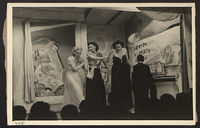Overview
- Brief Narrative
- The box was made by a Jewish communist inmate in Doftana Prison.
- Date
-
creation:
1934
- Geography
-
creation:
Romania
- Credit Line
- United States Holocaust Memorial Museum Collection, Gift of Radu Ioanid
Physical Details
- Classification
-
Containers
- Category
-
Boxes
- Object Type
-
Ornamental boxes (lcsh)
- Physical Description
- Wooden box with inlay cover depicting a female figure bound at the hands and feet inside a prison cell.
- Dimensions
- overall: Height: 6.500 inches (16.51 cm) | Width: 9.490 inches (24.105 cm) | Depth: 3.270 inches (8.306 cm)
- Materials
- overall : wood, metal
Rights & Restrictions
- Conditions on Access
- No restrictions on access
- Conditions on Use
- No restrictions on use
Administrative Notes
- Legal Status
- Permanent Collection
- Provenance
- The box was donated to the United States Holocaust Memorial Museum in 1991 by Radu Ioanid.
- Record last modified:
- 2022-07-28 18:24:31
- This page:
- https://collections.ushmm.org/search/catalog/irn23806
Download & Licensing
In-Person Research
- By Appointment
- Request 21 Days in Advance of Visit
- Plan a Research Visit
- Request to See This Object
Contact Us
Also in Teatrul Baraşeum and Elly Roman collection
The Teatrul Baraşeum and Elly Roman collection consists of documents, photographs, and a wooden box documenting Elly Roman’s work with the Teatrul Baraşeum in Bucharest during World War II.
Date: 1941-1945

Teatrul Baraşeum and Elly Roman papers
Document
The Teatrul Baraşeum and Elly Roman collection consists of an annotated business card, photographs, clippings, flyers, musical scores, and programs documenting Elly Roman’s work with the Teatrul Baraşeum in Bucharest during World War II, musical reviews, and performances of “Ce faci asta seara?” and “Ce faci dupa masa?” The Teatrul Baraşeum was a theater operated in Bucharest from 1941 to 1944 by a group of Jewish artists banned from Romanian cultural institutions under racist legislation during General Ion Antonescu’s administration. Performances were allowed only in Romanian under Antonescu, but Yiddish performances began following his overthrow. The Baraşeum was succeeded by the State Jewish Theater (Teatrul Evreiesc de Stat) under the communist regime. Elly Roman (1905-1996) was a Romanian composer whose works were performed at the Baraşeum.



